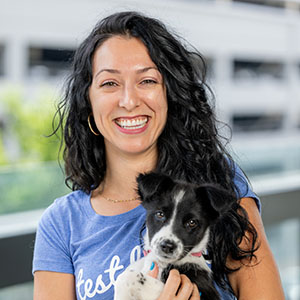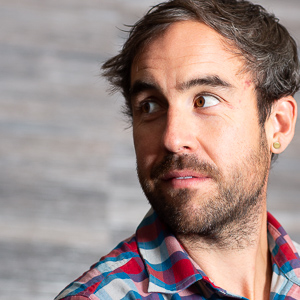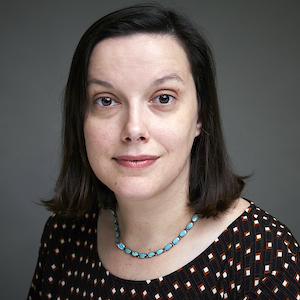Why our hiring process is focused on value alignment
- Publish Date
- Authors
- Anya Iverova
- Authors
- Dustin Tinney
- Authors
- Cathy Colliver
Talent Acquisition Manager Anya Iverova and Director of Qualification Dustin Tinney sat down to talk about the recruiting and interview process at Test Double and shared thoughts on why value alignment is so important to our hiring process.
Tell me three words you use to describe Test Double.
Anya: Collaborative, Test-Driven, and Thoughtful.
Dustin: Opportunity, Empathy, and Autonomy.
What are you looking for in software development experience from candidates?
Anya: On the technical side, several years of experience in one of our primary languages: Ruby, Rails, JavaScript, Elixir, Golang. I also look for experience around test-driven development, pair programming, working directly with clients (be it consulting experience or freelancing). Entrepreneurial experience, like running your own LLC or working at a startup, also stands out—it tells me you may feel comfortable working in a small, fast-paced team that requires continuous growth and learning.
Dustin: Being comfortable to come up to speed in new environments and having drive to want to learn and grow in new areas of tech. Consulting is somewhat unique in that we are continually working in new languages, frameworks, and client domains. You might be working in Fintech one week and retail the next. Comfort in taking your past experiences and quickly applying them to a new client is important.
What type of person thrives at Test Double?
Anya: A few immediate things come to mind. Somebody who is empathy-driven. We’re a small team, and every person and interaction counts. This starts with empathic communication, somebody who shows kindness, respect, thoughtfulness in their language. Echoing Dustin’s sentiments: somebody who is passionate about continuous learning and growth, who has an entrepreneurial mindset and also wants sustainable work habits. That type of person would likely really enjoy Test Double’s environment. The types of folks who go out and find solutions, get answers, and don’t need a lot of hand-holding in order to move forward—either on a project or learning about people—is the type of person that thrives here.
Dustin: Folks aligned with our mission and values. We exist to improve the way the world builds software. Individuals who are driven by this cause will do well here.
This goes beyond “writing good code” into areas like mentoring, qualification, communication, and a lot of what Anya commented on. Beyond our mission individuals interested in growth, inclusion, and helping others will thrive at Test Double.
What can candidates expect when going through the interview and hiring process at Test Double?
Anya: Our application process is pretty straightforward. We ask candidates to answer a few questions, including why they want to work at Test Double, upload their résumé, and from there our team reviews the application pretty quickly. If there’s alignment with their application and a current role, we’ll schedule a “Bridge Call,” which will be with me. Our Bridge Call is meant to introduce applicants to Test Double. We’ll talk about Test Double as a company and paint a bit of a picture as to who we are; we’ll go over our benefits and remote work culture; and finally, we’ll discuss the interview process—every single step—and end with Q&A.
The whole point here is to bring transparency into our interview process, our values, into who we are as a company before the candidate starts to interview with our team. Oftentimes, candidates have to dig for this information themselves—they have to do their own research and then hopefully ask the right questions from interviewers. Our Bridge Call knocks out a lot of these questions from the very beginning. I consistently hear applicants refer to our interview process as “transparent” and making them feel “safe” throughout the process.
Dustin: We try our best to have our interview process allow people to demonstrate real working skills. For example our pairing exercise tries to mimic a true client environment. We see “Quiz” based interviews, white-board sessions, and coding challenges as counter to what a healthy interview process should be. These examples do not represent real work environments and instead filter out good candidates who might not work well in these unrealistic scenarios.
Beyond that we do our best to create an equitable process by trying to keep our time requirements to a minimum and accommodating off hours interviews for folks who might not have a lot of flexibility in their current workplace.
Anya: Something to add is that we try to be empathetic and human when we let a candidate know that there’s not a fit. I try to provide some feedback to every candidate and, when applicable, share a reading list our own consultants follow. Eventually, I would love to provide more resources here, so that folks receive value from their time interviewing with our team.
Dustin: I think we try to make the interview process useful regardless of whether a candidate is accepted or not. When we disqualify a candidate, it’s an indication that there isn’t a fit—it’s not an indication that the candidate has not met some bar. We ask who can Test Double currently support and what type of skills are our clients currently looking for.
How has Test Double’s technical interview format evolved?
Dustin: Over the last year we’ve evolved our format in a few ways. First, we’ve started to expand our technical interview to better match the technologies and languages we offer. The root purpose of the questions have not changed, but now are focused in React, Elixir or DevOps.
We’ve also reworked our pairing session to better represent what really happens when 2 developers start working on a project together. This has helped create a better experience for both the candidates and the interviewers by giving candidates an idea of how we work while modeling our day-to-day for our interviewers to easily replicate.
How do Test Double values inform the recruiting and hiring process?
Anya: There are two values that stand out to me: open and honest communication, and empathy. From a recruiting standpoint, I speak with many candidates every single week. I try to do two things. First, I try to meet candidates where they’re at. I keep our conversations open ended from the beginning. I always state “I can talk a lot about Test Double in our phone call, but what I’d really like to know is where you’re at, what would you like to do next, and what would make you happy.” This strategy is more for me—it forces me to start with empathy, trying to envision where someone is in their career path, and whether or not Test Double aligns with their overall career and life goals.
From there, I try to be as open and honest as possible, learning about the person, speaking to my own experiences in product vs. consulting vs. startup companies, and throughout all of this, providing all the necessary bits of information around Test Double—our strengths, our challenges as our team expands, and all of the opportunities available here.
Dustin: We have questions which map back to each of our core values, and our interview process as a whole tries to represent our mission. Beyond that our values of Being Inclusive and Improving have really helped shape how we interview. Making sure our process is accessible to all types of candidates and improving areas where it is not.
What do you like most about working at Test Double?
Anya: There are a couple different things. For me, coming into Test Double was sort of a big decision, because I went from being a startup recruiter working with several different types of companies, to moving into a permanent, full-time role at one company. I was looking for a place that would have a level of autonomy, creativity, and ever-changing, ever-growing projects and responsibilities. And that’s exactly what I get at Test Double. So I feel like it has the creative, autonomous environment that I thrive in, but then there is financial stability and remote work infrastructure that makes all the difference.
As a female working in tech, I’ve always had this expectation that eventually, be it one week or 3 months in, the layers will peel back, and eventually, I’ll see that maybe folks aren’t as respectful towards women. Or don’t really make women feel comfortable, or females aren’t really a part of the conversation. It’s always happened—in every environment I’ve worked in—and I have my own ways of fighting it. It really threw me for a loop when I didn’t experience it in the first week…and didn’t experience it in the first month… and now here I am in month seven, feeling very much valued, respected, and part of the team. I now realize that I was sort of waiting for it to happen, perhaps a hidden expectation that many females have, but it just didn’t occur. I think this is by far the most thoughtful group of people I’ve ever worked with. All of this makes me feel very rooted in the company.
Dustin: I am very aligned with our mission and that is what keeps me here. I think, especially in tech, companies tend to overly focus on profit and exits without paying enough attention to why they exist and what they are creating.
Each year I find it more difficult than the previous to use the technology being created. Isn’t this backwards? Shouldn’t we be continuing to iterate, make things easier and more inclusive for all? I struggle to think just how far tech will leave each generation behind as it continues to become more and more intertwined within our lives.
What is something in software development that you’ve been thinking about a lot lately, and why?
Anya: Within the “software development ecosystem,” I think a lot about the candidate experience, particularly with recruiters. “Recruitment”—often times people cringe when they hear the word, and I speak to a lot of candidates who have been burned by recruiters in the past. A big part of my focus every week is really just getting folks to feel comfortable speaking about their career ambitions without feeling like they have to “sell” themselves to me, or that I’m going to ghost them or pressure them to apply.
Ultimately, my hope is that if I can focus on providing a quality experience and genuinely connecting with every single person I speak with, from going in-depth into their line of work, chatting about their approach to test-driven development—all the things that make up their day—then maybe I can start to change the relationship folks have with recruiters, and perhaps they’ll experience good vibes when considering Test Double or referring someone to us.
Dustin: I’m a late adopter so I’m pretty far removed from the “next big thing” but am always listening to our 60+ Software Consultants and wondering what the next big framework, language or technology will be.
I do get asked a lot in our interview process “What is the Test Double way?” I think it’s a really interesting question. We engage directly with client teams, and we meet those teams where they are. While many teams will share dysfunctional symptoms, the root causes will vary. There is no “one way”. One team might find success with tighter feedback loops and expanding their automated testing while another may need folks to let go of some legos and more documentation. It’s up to us, as consultants, to identify those root causes and help teach teams to identify them on their own.
This model is the only way we will make any type of dent in our mission. By teaching others how to create better software.
This interview is based on a recorded conversation with Anya Iverova, Dustin Tinney and Cathy Colliver. It may or may not self-destruct.
Anya Iverova
- Status
- Double Agent
- Code Name
- Agent 0075
- Location
- Miami, FL
Dustin Tinney
- Status
- Double Agent
- Code Name
- Agent 0013
- Location
- Bend, OR
Cathy Colliver
- Status
- Double Agent
- Code Name
- Agent 0080
- Location
- Louisville, KY


